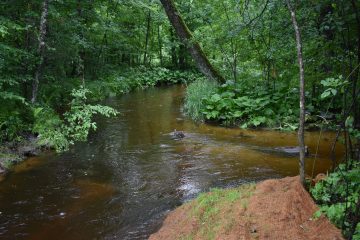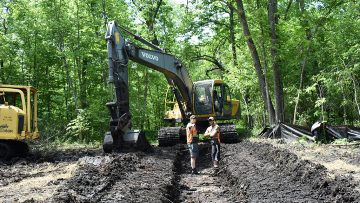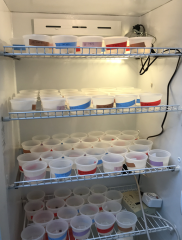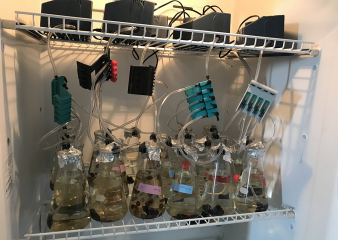Several University of Wisconsin Oshkosh students spent their summer performing environmentally focused research—studies that might have involved standing in a stream, analyzing the abundance of moss and algae or the decomposition of leaves.
The research is funded jointly with UW Oshkosh sustainability grants from Sustainability Institute for Regional Transformations (SIRT) and the Office of Student Research and Creative Activity (OSRCA)—programs seeking to raise corporate donations to fund more research projects in the future.

Stream reduction
Hannah Nauth, a senior biology major from Washburn, Illinois, has been busy with a water discharge experiment that modulates the amount of water flowing through Emmons Creek in Portage County. Working collaboratively with the Department of Natural Resources whose staff used heavy equipment to create a diversion channel, Nauth reduced the amount of water by 50 percent. She has been looking at the changes to algae and moss and what it means to invertebrates—aquatic insects—in the stream and to fish.
“We’re redirecting the flow of the stream,” said Professor Robert Stelzer, who is overseeing the research to reduce the stream’s flow. “It’s happening (the reduction) in nature and with wells.”
Nauth has been assisted on the project by Nathan Nozzi, who graduated with a biology degree and is starting his master’s degree program.

Salt concentration
Shelby McIlheran, of De Pere, is a biology major who will enter her second year of graduate school this fall.
McIlheran’s research looks at how salt affects organisms that decompose leaves in streams. Other studies have shown chloride concentrations in water bodies are increasing—and likely linked to the use of road salt. McIlheran is trying to determine how different concentrations of salt affect microbes like bacteria and fungi and invertebrates like amphipods.
“So far, it seems like higher concentrations of chloride are more lethal to the amphipods than the lower concentrations,” she said. “We still have to check all the data and do some statistical analysis to find if there are any sub-lethal effects on the amphipods or microbes.

McIlheran said her career plans are to continue work with freshwater biology. She hopes to present her research at Celebration of Scholarship in the spring and likely at other conferences.
“Doing this research is benefitting me since I had to design and set up the experiments and with help from Dr. Stelzer, think of all the different variables to measure and how to measure them,” she said. “I also gained both lab and field skills working on this experiment which can help me in the future.”
Changing climate
Joseph Mercan is working with Sabrina Mueller-Spitz on environmental research to see how two types of Deinococcus aquaticus, a type of bacteria isolated from areas around Lake Winnebago, respond to drying and dehydration cycles when they are in biofilms—a slimy film that bacteria form when they attach to surfaces.
“The idea is to simulate rising and falling water levels that bacteria might experience in lakes and rivers (which will be affected by climate change) and see if one of the groups is better adapted to handle these new conditions,” Mercan said.
The senior microbiology major who resides in Oshkosh said work in the lab helps him see how microbiology is applied in the real world and helps him develop skills that will be useful in any field.
Attention to detail, planning and problem-solving skills are some that he has honed.
“The work challenges you to not only make decisions,” Mercan said, “but to think about the reasons behind the decisions you make and what impact each option will have.”

Real-world experience
“Research helps with critical thinking skills and to gain independence,” Stelzer said. “The idea is to train students to do independent projects.”
Stelzer said it would not be likely or practical for someone to be looking over their shoulder in a workplace setting and assisting at each step in the process.
“At times it’s very beneficial for students to be struggling and wonder how to do something-to trouble-shoot and figure it out on their own.
“One of the things it can bring is confidence,” Stelzer added. “It pushes them forward in the future and they may be likely to take on a bigger project. I think employers want people who can think independently and work independently.”
Learn more:
UW Oshkosh Sustainability Institute for Regional Transformations (SIRT)
UW Oshkosh Office of Student Research and Creative Activity (OSRCA)
